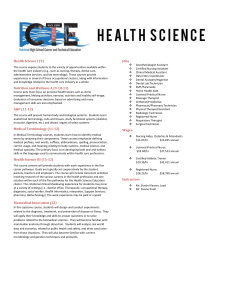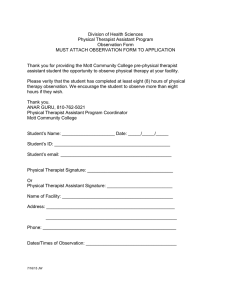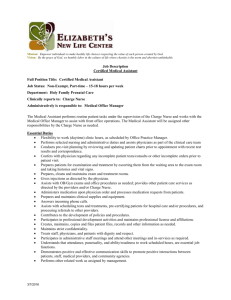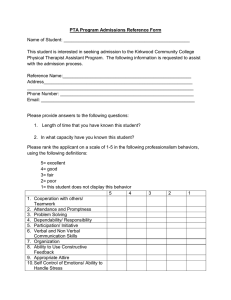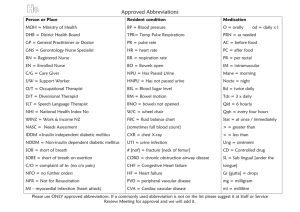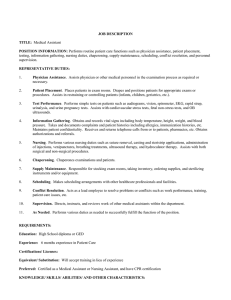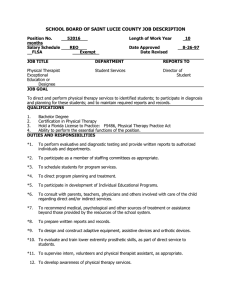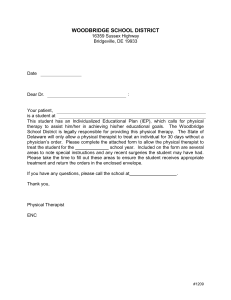Health Career Job Descriptions
advertisement
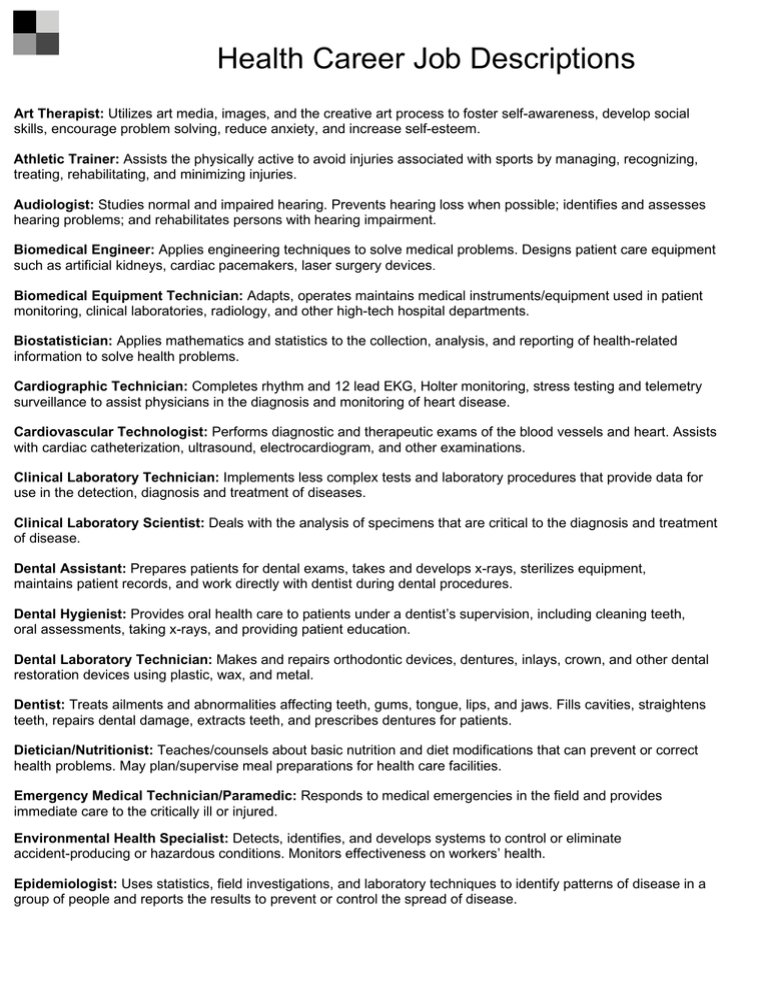
Health Career Job Descriptions Art Therapist: Utilizes art media, images, and the creative art process to foster self-awareness, develop social skills, encourage problem solving, reduce anxiety, and increase self-esteem. Athletic Trainer: Assists the physically active to avoid injuries associated with sports by managing, recognizing, treating, rehabilitating, and minimizing injuries. Audiologist: Studies normal and impaired hearing. Prevents hearing loss when possible; identifies and assesses hearing problems; and rehabilitates persons with hearing impairment. Biomedical Engineer: Applies engineering techniques to solve medical problems. Designs patient care equipment such as artificial kidneys, cardiac pacemakers, laser surgery devices. Biomedical Equipment Technician: Adapts, operates maintains medical instruments/equipment used in patient monitoring, clinical laboratories, radiology, and other high-tech hospital departments. Biostatistician: Applies mathematics and statistics to the collection, analysis, and reporting of health-related information to solve health problems. Cardiographic Technician: Completes rhythm and 12 lead EKG, Holter monitoring, stress testing and telemetry surveillance to assist physicians in the diagnosis and monitoring of heart disease. Cardiovascular Technologist: Performs diagnostic and therapeutic exams of the blood vessels and heart. Assists with cardiac catheterization, ultrasound, electrocardiogram, and other examinations. Clinical Laboratory Technician: Implements less complex tests and laboratory procedures that provide data for use in the detection, diagnosis and treatment of diseases. Clinical Laboratory Scientist: Deals with the analysis of specimens that are critical to the diagnosis and treatment of disease. Dental Assistant: Prepares patients for dental exams, takes and develops x-rays, sterilizes equipment, maintains patient records, and work directly with dentist during dental procedures. Dental Hygienist: Provides oral health care to patients under a dentist’s supervision, including cleaning teeth, oral assessments, taking x-rays, and providing patient education. Dental Laboratory Technician: Makes and repairs orthodontic devices, dentures, inlays, crown, and other dental restoration devices using plastic, wax, and metal. Dentist: Treats ailments and abnormalities affecting teeth, gums, tongue, lips, and jaws. Fills cavities, straightens teeth, repairs dental damage, extracts teeth, and prescribes dentures for patients. Dietician/Nutritionist: Teaches/counsels about basic nutrition and diet modifications that can prevent or correct health problems. May plan/supervise meal preparations for health care facilities. Emergency Medical Technician/Paramedic: Responds to medical emergencies in the field and provides immediate care to the critically ill or injured. Environmental Health Specialist: Detects, identifies, and develops systems to control or eliminate accident-producing or hazardous conditions. Monitors effectiveness on workers’ health. Epidemiologist: Uses statistics, field investigations, and laboratory techniques to identify patterns of disease in a group of people and reports the results to prevent or control the spread of disease. Equine Assisted Psychotherapist: Utilizes an effective therapeutic approach in which horses are used as a tool for emotional growth and learning. Exercise Physiologist: Delivers treatment services concerned with improvement and maintenance of health and fitness, rehabilitation of heart disease, other chronic diseases, and disabilities. Gerontologist: Studies the physical, mental, and social changes in people as they age. Examines the changes in society and applies this knowledge to policies/programs. Health Care Administrator: Can be specialist managing a department such as finances, human resources, medical staff relations or can be generalist managing an entire facility or health system. Health Educator: Plans, implements, and evaluates the effects of educational programs for the public designed to promote good health and prevent disease. Health Information Administrator: Develops and manages information systems for recording, storage, and retrieval of large amounts of medical data in both paper and electronic forms. Health Information Technician: Prepares, analyzes, stores and retrieves medical information needed by the patient, hospital, physician, insurance, registries, or other health agencies. Health Sciences Librarian: Assists health professionals, medical researchers, students, and patients by finding the information for patient care, education, research and administration. Horticultural Therapist: Conducts assessments and develops treatment plans utilizing gardening skills as therapy to improve patient disability, injury, and illness. Human Services Worker: Provides general health and assistive services to clients in a variety of social, education, community and health care settings. Massage Therapist: Administers therapeutic massage to reduce stress, complement athletic performance, lower blood pressure, improve circulation, emotional, and mental well-being. Medical Admissions Clerk: Arranges the registration, admission, and discharge of patients at medical facilities, thus ensuring proper documentation of patient activities. Medical Assistant: Assists physicians by performing a variety of clinical and administrative duties. The range of their duties depends on the size of the physician’s practice. Medical Coder: Assigns codes to each symptom, diagnosis, disease and procedure that appears on a patient’s record for federal regulations, insurance reimbursement, and health-planning analysis. Medical Secretary: Performs a variety of administrative duties to keep a medical office operating efficiently for patient and physician. Medical Transcriptionist: Transcribes dictation by physicians and other health care professionals. The approved dictated reports become a part of the patient’s permanent file. Music Therapist: Uses music to address physical, emotional, cognitive, and social needs of individuals of all ages. Nuclear Medical Technologist: Administers small amounts of radiopharmaceuticals to patients under a physician’s supervision, to monitor structure and function of a specific organ. Nurse Anesthetist: Dispenses anesthesia in all types of surgical cases, applying all the accepted anesthetic techniques – general, regional, local or sedation. Nurse, Clinical Specialist: Provides direct care to patients, teaches in a variety of health care settings, or works as a researcher, consultant, case manger or nurse leader/administrator. Nurse, Licensed Practical Nurse: Gives basic bedside care and performs a variety of other nursing duties under supervision of physician or registered nurse Nurse-Midwife: Provides pre-conception, maternity, and post-partum care for women at low risk for complications. May also provide “well-woman” care, which includes gynecological services. . Nurse Practitioner: Takes medical histories, performs physical examinations, orders appropriate tests, diagnoses, and prescribes medications and treatment for health problems. Nurse, Registered: Provides care, treatment, counseling, and health education to ill or injured people. Educates individuals and families to promote health, and prevent injury and illness. Nursing Assistant: Gives personal care to people of all ages under nursing supervision in various types of health care settings. Occupational Therapist: Evaluates disabled patients and develops appropriate adaptive equipment/devices to develop, recover, or maintain activities of daily living and work skills. Occupational Therapy Assistant: Assists the occupational therapist with treatment programs to help patients develop, recover or maintain activities of daily living. Pharmacist: Measures, inspects, prepares and distributes medications used to treat patients. Maintains records and reports required in the preparing, dispensing and storing of medications. Pharmacy Technician: Assists pharmacists with technical tasks such as filling prescriptions and other dispensing duties. Phlebotomist: Draws blood samples from patients using accurate, efficient, and minimally painful techniques. Physical Therapist: Treats patients by administering procedures such as exercise, heat, electrical stimulation, massage to relieve pain and help regain as much use of their muscles as possible. Physical Therapist Assistant: Teaches patients recovery exercises and implements treatment programs designed by the physical therapist. Physician Assistant: Works directly with physicians to obtain medical histories and physicals. The scope of practice corresponds to the supervising physician’s practice. Physician, DO and MD: Performs medical examinations, diagnoses illnesses, prescribes medications, and completes various procedures designed to help people maintain or regain health. Psychologist: Focuses on learning how humans think, act, and feel; and works to improve how human react with their environment. Radiologic Technologist: Takes x-ray images for the physician to use in the diagnosis of disease or injury. Recreation Therapist: Evaluates, establishes and coordinates therapeutic recreation for inpatients and outpatients to meet their physical, social and emotional needs. Respiratory Therapist: Works under the supervision of a physician and plays a key role in the evaluation, treatment, and monitoring of patients with respiratory and cardiovascular disorders. Social Worker: Helps patients and their families deal with problems related to physical, mental, or emotional illness and disability. Sonographer: Uses high-frequency sound waves to create body images that show the shape/ composition of body tissues to assist doctors in diagnosing disease or injury or checking a fetus. Speech-Language Pathologist: Specializes in the assessment, treatment and prevention of various communication disorders as well as problems that make eating and swallowing difficult. Speech-Language Pathologist Assistant: Conducts language screenings in the public schools following established protocols under the supervision of a speech-language pathologist. Surgical Technologist: Works as a member of the surgical team to prepare the operating room for surgery, assists during surgery, and performs the proper post-operative procedures. For additional information, see Health Careers Resource Guide at www.wku.edu/scahec Permission to use, link to, copy and distribute this document in whole or in part for NONCOMMERCIAL purpose and without fee, is hereby granted, provided that appropriate credit to this document’s author (Glynda Stone, RN MPH, South Central KY AHEC) be included.
